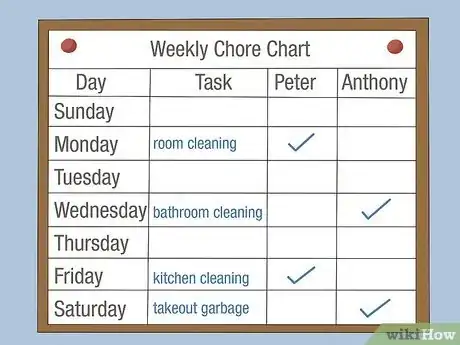This article was co-authored by Kelli Miller, LCSW, MSW and by wikiHow staff writer, Nihal Shetty. Kelli Miller is a Psychotherapist based in Los Angeles, California. Kelli specializes in individual and couples therapy focusing on relationships, depression, anxiety, sexuality, communication, parenting, and more. Kelli also facilitates groups for those struggling with alcohol and drug addiction as well as anger management groups. She is the author of “Professor Kelli’s Guide to Finding a Husband” and the award-winning and best-selling book “Thriving with ADHD”. Kelli co-hosted an advice show on LA Talk Radio and is a relationship expert for The Examiner. She received her MSW (Masters of Social Work) from the University of Pennsylvania and a BA in Sociology/Health from the University of Florida.
There are 11 references cited in this article, which can be found at the bottom of the page.
This article has been viewed 6,950 times.
You want to live in a happy and healthy environment, but what do you do when your roommates are making this impossible? By setting clear boundaries and learning how to talk about issues in your living situation clearly and kindly, there’s a good chance you can fix even some of the toughest living situations. We’re here to show you how with this complete guide on how to deal with bad roommates.
Steps
Establish ground rules.
-
Boundaries are crucial for your relationship with your roommates. It’s a good idea to discuss ground rules whenever someone new moves in, but it’s never too late. You may even want to consider a contract signed by everyone living in the house to make each of your responsibilities and boundaries clear. Together with your roommates, discuss policies answering the following questions, but feel free to add any other matters that are important to you:[1] X Research source
- How often should the common living areas be cleaned?
- How are the costs of items like paper towels, toilet paper, or cleaning supplies split?
- Should overnight guests be announced in advance?
- What is the alcohol or drug policy for your living space?
- Who is responsible for making sure bills get paid on time?
- Are you okay with pets?
- When is it okay to borrow items from each other?
- Are parties acceptable?
- Is there a set hour that you should be quiet at night?
Use visual aids to make responsibilities clear.
-
A chore calendar or chart keeps household tasks organized. If your roommates aren’t doing their fair share of household duties, make a chore calendar to keep things on a schedule. You should include what responsibilities need to be taken care of each week, and who is responsible for doing them.[2] X Research source
- A white-erase calendar can be great for this, but in a pinch, you can also make a written list of responsibilities and hang it in a common space.
Keep relationship expectations realistic.
-
Your roommates might not become your best friends, but that’s okay. It can be disappointing to move in with others and realize that you won’t be as close as you might like. But keep in mind that for many people, a good roommate is simply a courteous roommate. If you feel like you might have unrealistic expectations for your relationship with your roommates, try to find meaningful connections elsewhere.[3] X Research source
- If you’re struggling to make friends, try joining clubs or hobby groups. Pretty soon, you’ll feel way better about not being able to count on your roommate as a close friend.
Set a good example.
-
Leading by example is a great way to encourage change. Although your roommates may be completely irresponsible, it can be tough for them to figure out their expectations if they don’t have a good model. Be that model for them by meeting your own responsibilities consistently.
- For example, if you want your roommates to do their dishes, make sure that you don’t leave yours in the sink for too long.
- Or, if you need your roommates to be quieter at night, be sure that you’re using headphones and keeping nighttime conversations at a low volume.
Address problems early and face-to-face.
-
Talking about issues as soon as they come up keeps them from growing. It’s normal to run into the occasional problem with your roommates, but by addressing them head-on, you can keep resentment from building up. Discuss 1 specific problem at a time. Try saying something like:[4] X Research source
- “Last night, I had a hard time going to sleep because of some of the noise. Would you mind keeping things quiet after 10 p.m.?”
- “I noticed that the dishes have been piling up in the sink for a while. Can you make sure that you take care of those today?”
- “I know that you might be going through some difficulties right now, but it’s really important that you pay the rent on time. Will you be able to do this next month?”
- Although text might be okay for talking about minor issues, it’s better to save major conversations for a face-to-face conversation. Texts can become passive-aggressive quickly, and can sometimes lead to a lack of honesty.[5] X Research source
Keep communication respectful.
-
Kind communication makes disagreements more manageable. When you’re roommates are making your life difficult, it’s easy to take shots at their character. But try to resist this urge when you’re speaking with them about issues in your home. Try using “I-statements” instead of saying anything negative about your roommates’ personalities to keep your relationship civil. For example:[6] X Trustworthy Source PubMed Central Journal archive from the U.S. National Institutes of Health Go to source [7] X Expert Source

Psychotherapist Expert Interview. 11 June 2020.- Instead of saying, “You’re messy,” say, “I feel frustrated that I have to do so much cleaning here.”
- Instead of saying, “You’re loud,” say, “I feel exhausted during the day when the noise keeps me up at night.”
- Instead of saying, “You’re inconsiderate,” say, “I feel like my concerns sometimes aren’t being heard.”
- "I-statements" are less likely to put the other person on the defensive.[8]
X
Expert Source

Psychotherapist Expert Interview. 11 June 2020.
Offer help when coming up with solutions.
-
Letting your roommates know you want to help keeps things friendly. After addressing an issue with your roommates, offer them a solution or invite them to help you come up with them to keep any problems from happening again. For example, you might say something like:[9] X Research source
- “It’s great that you’ve been cooking so much great food, but the kitchen is a mess. How about I help you clean it this time, and then we work on cleaning immediately after cooking in the future?”
- “I know your time with your boyfriend is important, but it’s tough for me when he leaves a mess in the bathroom. Let's try switching our cleaning schedule so you two do the cleaning when he’s staying here.”
- “I realize that times have been tough for you at work lately, but I’m having a hard time covering rent by myself. Can I help you look for a new job?”
Rearrange your bedroom and common areas.
-
Changing your furniture layout makes your home more livable. Studies have shown that the simple act of rearranging your living space can make you feel safer and more comfortable, simply because you’re proving to yourself that you can change your environment to your liking. Moving around your furniture can alleviate any distractions from your roommates, but it also makes you feel better about where you live.[10] X Research source
- For example, if the walls in your living space are too thin, try moving your bed to the side of your room away from the rest of the house.
- Or, if you share a room with your roommate, consider buying a room divider to give you each some more privacy.
Find a place to escape to.
-
If things are tough at home, head outside. Being cooped up with bad roommates can make you feel upset and anxious, so restore yourself by going to a favorite park or coffee shop. Spending more time outside of your home can keep you feeling level-headed, and can make even the most difficult roommate situations feel more manageable.[11] X Trustworthy Source American Heart Association Leading nonprofit that funds medical research and public education Go to source
- The mental health benefits of spending some time outdoors are innumerable. Studies have shown that going outside keeps your stress levels down and can even improve your memory.
Seek outside help.
-
If your roommates are affecting your mental health, find outside support. You don’t have to deal with this alone, and remember that you have other relationships outside of your home to support you. Using these sources of support can make you feel a lot better about your living situation. For example:[12] X Research source
- Talk to your friends or family members about your issues with your roommates, but be sure to ask them for advice. When solution-focused, a little bit of venting can make you feel better.[13] X Trustworthy Source Greater Good Magazine Journal published by UC Berkeley's Greater Good Science Center, which uses scientific research to promote happier living Go to source
- If you’re in college, try talking to your RA, who is likely trained in dealing with these exact issues.
- If your roommates are making you feel physically unsafe, you may have to get in contact with the police. Your safety matters.
- A therapist can help you process your emotions and give you conflict resolution strategies.
Move out.
-
If nothing else works, it’s time to move out and on. Staying in a negative living environment can do a lot of harm to your mental health, and there’s no shame in deciding that you can’t put up with it any longer. Plan for a move-out date and try to spend as little time at home as possible until then. You deserve to live in a place where you feel comfortable and happy.[14] X Trustworthy Source Mind U.K.-based mental health charity focused on providing advice and resources to anyone facing mental health problems. Go to source
- If you’re in college, your housing office likely has an option to request a room transfer. This is a relatively common procedure, so don’t hesitate to take advantage of it.
You Might Also Like










References
- ↑ https://www.apartmentguide.com/blog/roommate-agreement-essential-topics/
- ↑ https://www.apartmentguide.com/blog/dividing-up-chores-with-your-roommates/
- ↑ https://reslife.cofc.edu/living-with-a-roommate/index.php
- ↑ https://www.nytimes.com/2020/04/16/smarter-living/coronavirus-roommate-fight-home.html
- ↑ https://www.sauder.ubc.ca/news/new-sauder-research-people-more-likely-lie-when-texting
- ↑ https://www.ncbi.nlm.nih.gov/pmc/articles/PMC5961625/
- ↑ Kelli Miller, LCSW, MSW. Psychotherapist. Expert Interview. 11 June 2020.
- ↑ Kelli Miller, LCSW, MSW. Psychotherapist. Expert Interview. 11 June 2020.
- ↑ https://www.nytimes.com/2020/04/16/smarter-living/coronavirus-roommate-fight-home.html
- ↑ https://www.apartmenttherapy.com/mental-benefits-of-rearranging-a-room-37000508
- ↑ https://www.heart.org/en/healthy-living/healthy-lifestyle/stress-management/10-ways-to-relax-in-nature-and-stress-less
- ↑ https://www.nytimes.com/2020/04/16/smarter-living/coronavirus-roommate-fight-home.html
- ↑ https://greatergood.berkeley.edu/article/item/does_venting_your_feelings_actually_help
- ↑ https://www.mind.org.uk/information-support/guides-to-support-and-services/housing/housing-and-mental-health/
























































Medical Disclaimer
The content of this article is not intended to be a substitute for professional medical advice, examination, diagnosis, or treatment. You should always contact your doctor or other qualified healthcare professional before starting, changing, or stopping any kind of health treatment.
Read More...